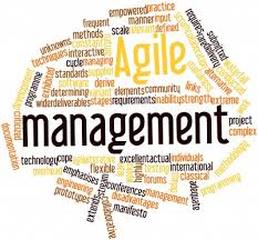One management style which some companies – especially those that are tech based - are adopting to meet the challenges of the global marketplace is known as agile. Agile management, championed by companies such as Google and music streaming giants Spotify, essentially divides a business into small teams of workers that act like start-ups in their own right. Agile centres on the idea that employees should be largely self-organised and collaborate on a level playing field for the benefit of the business.
Clearly these types of changes to management have vast implications for HR departments. It is important to note that agile management has many different facets. The focus here is to look at how HR Departments should adjust and adapt in a business switching to, or thinking of taking on aspects of, agile management.
So, here are 3 ways that agile management can influence HR:
1. Making Everything Continuous/Ongoing
In this day and age, product and project cycles work on a month-to-month or even week-to-week basis, rather than year-to-year. Agile management stresses the need for ongoing, continuous feedback and review of company progress, as opposed to annual reports. Here are three main areas HR departments should be prepared to tackle on an ongoing basis:
- Talent Acquisition:
Instead of hiring once or twice a year, companies are much more likely to hire as and when they require skilled staff. This means HR departments should be constantly on the lookout for staff suited to their business and regularly sounding out areas of the business that might be understaffed.
- Feedback:
Rather than providing yearly feedback to staff, HR departments in an agile management structure should be much more ready to give regular feedback to employees. While this may be time consuming, it helps to encourage and motivate staff and make sure the business is as productive and efficient as it can be.
- Training:
Under agile management, HR departments should see training as a continuous process, rather than a one off thing. Making sure your employees are regularly well trained and up-to-date in their department will ensure your company is more effective. A key role of HR is also to monitor performance – providing regular training is one way to keep all employees performing to the best of their ability.
2. Demands a Concentrated Focus on Teamwork
With agile management there is much less importance placed on the individual employee - it’s all about teamwork and how employees collaborate with one another. This means that the HR department must move away from focusing on individual merit and instead hone in on how teams work together, helping to ensure the smooth running of the team as a whole.
Of course this also changes the role of the managers in a company. It is essential that HR departments encourage managers to be much more interactive, hands on, and engaged with their team. HR must preach the idea that employees are on a level-playing field – something which can be hard for many managers to handle. HR may even be required to come up with new roles and methods of assessment that promote cross-functionality between teams.
3. Changes in Company Culture
Clearly, with an agile management system, the company ethos will have changed greatly. Having a harmonized company culture is essential, especially when it comes to hiring new talent, and it’s an area where HR can lead the way. HR should make sure there is a homogenised company culture that all employees understand and support.
In addition, current employees may not be used to organising themselves and being given more flexibility – HR can assist in these areas in order to make sure companies get the best out of their staff and ensure talent retention. The key here is for HR to demonstrate that with agile management, leadership takes much more of a bottom-up rather than top-down approach. Clearly this is unconventional and may take time for employees to get used to, however it has the potential to make a company more effective and efficient, while promoting equality in the workplace.
Of course, agile management isn’t suited to every business. Companies may well pick and choose the ‘best-bits’ of agile management and implement them as they see fit, or opt for entirely different systems. However, the reality is that as companies look to change their management structure to meet the every day pressures of a fast-paced and ever-changing working environment, HR needs to make sure it doesn’t get left behind. As different companies adopt different management styles, the HR department must be versatile and adapt to any changes in order to stay in line with the rest of the business and remain an integral part of its success.
For more helpful HR tips and advice, CLICK HERE to sign up to our monthly newsletter.


 RSS Feed
RSS Feed